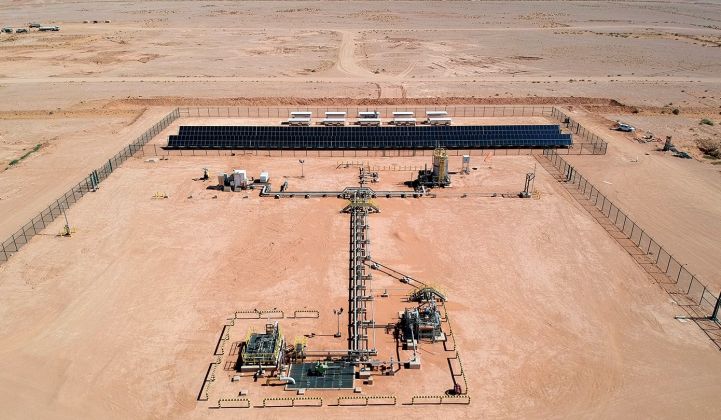Investors in Saudi Aramco’s upcoming IPO could be purchasing a stranded asset if the oil behemoth sticks to its guns on fossil fuels.
Despite Saudi Arabia’s big plans for solar and Aramco’s own impressive spend on renewables, the state-owned petrochemical behemoth largely views clean energy as a means to improve the efficiency of extraction, said Bloomberg New Energy Finance oil specialist David Doherty.
That’s not likely to change as Aramco seeks to attract outside investment, Doherty told GTM.
While other major oil and gas firms have started diversifying into clean energy fields ranging from offshore wind to electric vehicle charging, Aramco has “pretty much focused on technologies that can push demand for their products,” he said.
This includes 3D printing, which could boost the market for petrochemical-based composites, as well as carbon capture and storage. The company has invested significant amounts into renewable energies such as solar, but almost entirely with a view to powering extraction or refinery operations, Doherty said.
In terms of diversification, Saudi Aramco has "been pretty lackluster compared to other companies of that size,” he said.
“They’re moving toward using solar panels to power their refineries,” he said, and “looking at securing demand for their products — as opposed to jumping into wind like Equinor or everything like Shell.”
In September, Aramco trumpeted a collaboration with Saudi Arabia’s Power Systems Renewables Department to deploy renewable energy in on- and off-grid oil extraction facilities.
“Over the years, technological improvements and decreasing costs in the energy storage field have made the use of solar photovoltaics and off-the-grid solar photovoltaic energy storage systems preferable to more traditional forms of energy at industrial sites,” the company said.
"The greenest possible barrel"
Aramco’s media relations department confirmed that the company is committed to deploying renewables as a way of reducing emissions from its current operations.
“In order to achieve a low-carbon future, we believe it is necessary to meet both global energy demand for ample, reliable and affordable energy and lower emissions,” the company said in an email.
“That must include responsible investments which reduce the overall carbon footprint of the oil and gas industry and end-use markets.”
Saudi Aramco's clean-energy achievements include “near-zero gas flaring and the lowest carbon intensity of any major oil producer," the company said.
It's researching low-emission transport systems, including next-generation internal combustion engines, “as well as the fuels to power them.”
A tough sell
None of this amounts to an admission that the company intends to diversify away from oil in the future. Instead, said Doherty, “they want to find the greenest possible barrel.”
This does not mean Aramco’s cleantech investments should be ignored. In areas such as carbon capture and storage, a concerted spend by an investor the size of Aramco might have a material impact on the pace of progress.
So far, there is no evidence that a more determined diversification strategy has made companies such as Shell any more palatable to environmentally conscious investors.
In September, Danish pension fund MP Pension joined a growing list of institutional investors divesting from the oil sector, blacklisting 10 companies — including rapidly diversifying majors Shell, Equinor and BP.
Growing animosity toward the oil sector could be a problem for Aramco as it seeks to carry off the biggest IPO in history.
In theory, the fact that it is the most profitable company on the planet would seem to make Aramco a magnet for investors after the Saudi administration announced it was putting 1.5 percent of the business up for sale on Dec. 4.
So far, however, the listing looks likely to be heavily reliant on local investors, having not yet drawn big interest from investors around the world, Reuters reported on November 22.
Concerns over the response to the IPO have already led Aramco to scale back its listing ambitions. On Nov. 17, the company lowered its proposed valuation from $2 trillion to between $1.6 trillion and $1.7 trillion.
At the same time, it canceled investor roadshows in Europe and pulled marketing in American and Asian markets to focus instead on local investors. It remains to be seen whether Middle Eastern backers will be put off by Aramco’s apparent lack of diversification plans.
For any investor looking to put money into Aramco in the long term, the decreasing attraction of oil as an asset should give pause for thought.
"Shell wants to become a big energy company," Doherty said, whereas Aramco's approach amounts to this: "The last barrel to be taken out of the ground will be the cheapest."




